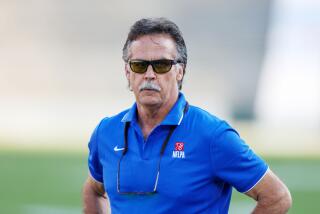Chief Executive of Farmer Bros. Hands Reins to Son
- Share via
Roy F. Farmer, the patriarch who has guided Farmer Bros. Co. for more than five decades, handed day-to-day control of the Torrance-based coffee distributor to his son Roy E. Farmer on Thursday.
In a Securities and Exchange Commission filing, the company said Roy F. Farmer, 86, will remain chairman of the company his father and uncle founded 91 years ago and that his son Roy E. Farmer will take over daily operations as chief executive. The younger Farmer, 50, has spent his entire career at the firm and until Thursday was president and chief operating officer.
The management transition comes at a time when the thinly traded public company is under increasing pressure from institutional investors and dissident family members to disclose more information about its investments and operations.
Last week, Atlanta money manager Marc Heilweil of Spectrum Advisory Services Inc. sent Farmer Bros. a letter demanding more information about the company’s $300-million cash stockpile -- an amount equal to 70% of its assets -- and its investment strategies. Heilweil, who holds about $1 million in Farmer shares, said he also wants to know more about Farmer Bros. real estate holdings, coffee business and other assets.
Heilweil said the information would be helpful in determining the value of the company.
Franklin Mutual Advisors, a mutual fund that owns nearly 10% of Farmer, and Steven Crowe, a nephew of Roy F. Farmer, would like to see management buy out shareholders in a transaction that would take the company private. The Crowe family owns about 23% of Farmer Bros. shares.
Despite Thursday’s management change, the elder Farmer will maintain a firm grip on the company and its board through the roughly 50% of the shares he owns or controls in family trusts and the employee stock ownership plan.
His conservative management style, as well as his practice of avoiding communication with Wall Street analysts and shareholders, has become a source of contention between the Farmers and the Crowe family and other stakeholders. Franklin and several large investors were particularly irked by the company’s scheduling of its annual meeting on the day after Christmas.
They still are irked.
“What I would like to hear from my cousin is what he plans to do strategically to grow the business,” said Steven Crowe, adding that Farmer Bros.’ sales have declined steadily from a high of $240 million in 1998 to $206 million last year.
In the SEC filing, Roy E. Farmer indicated that the company could be looking for an acquisition, but said little else about his strategy. “To be sure,” he said, “we have our eyes open for businesses that will complement our business, when the time is right.”
He defended Farmer Bros.’ cash holdings as an important asset that provides the company with flexibility and helps the rapid price changes that occur in what is largely a commodities business.
Both Farmers declined to be interviewed.
The company also declined to say why the management change was being made at this time. The elder Farmer has been ill and missed the last shareholders meeting. He has attended only half of the company’s board of directors meetings over the last two years.
Management of Farmer Bros. has rejected much of the criticism from outside shareholders, saying they have been well-served by the company’s investment gains.
“Farmer Bros. has raised its dividend 7.5% annually since 1998. Our stock price has increased since 1980 from $17 to more than $300,” the company said in a statement after receiving Heilweil’s letter.
Shares of Farmer Bros. fell 50 cents Thursday to close at $312.50 on Nasdaq, giving the business a stock market value of $602 million.
More to Read
Inside the business of entertainment
The Wide Shot brings you news, analysis and insights on everything from streaming wars to production — and what it all means for the future.
You may occasionally receive promotional content from the Los Angeles Times.











